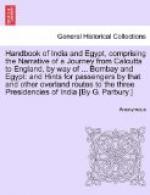And it came to pass in the fulness of time, as the Sahyadri-khand tells, that Parashurama called all Brahmans to a great festival in the new land which he had created between the mountains and the sea. But the twice-born hearkened not to his words; whereas the God waxing wroth determined to create new Brahmans who would not turn a deaf ear to his counsel. Revolving this decision in his heart he walked down to the shore, and there in the seaward-gazing burning-ground he met a stranger-people, white-skinned, blue-eyed, and fair to look upon, and asked them who they were and whence they came. “Fishermen (or hunters) are we,” they answered, “and dwell upon the seashore, sixty families of us in all.” And the God was pleased with them and raising them to the rank of Brahmans, divided them into fourteen “Gotras,” and made them a solemn promise that should they ever call him to mind in any real emergency he would come to their assistance. So they dwelt for many a day, waxing by the favour of God both numerous and learned, until by ill-hap they hearkened into evil counsel and called upon the God without just reason. And He, when he learned what they had done, was exceeding wroth and cursed them, dooming them to sorrow and to the service of other men so long as the sun and moon should endure. Thus the Chitpavans gained their Brahmanhood, but lost their right to superiority in that they flouted the promise of their God.
Such are the legends, popular and Puranic, of the coming of the Chitpavans to Western India. That some historic truth lies below the garbled tale of shipwreck and resurrection is partly proved by the physical traits of their descendants,—of those men, in fact, whose immediate ancestors, employed at first as messengers or spies of Maratha chieftains, by innate cleverness, tact, and faculty for management gradually welded together the loose Maratha confederacy and became directors of the internal and external politics of the Peshwa’s dominions. For to this day the true Chitpavan perserves the fair skin, the strange grey eyes, the aspect of refined strength and intelligence, which must have characterized the shipwrecked mariners of old fable and marked them out in later years as strangers in a strange land. But whence came they, these foreign immigrants, who after long sojourn in the country of their adoption moved upwards to the Deccan and stood within the shadow of the Peshwa’s throne? Much has been written of their origin, much that is but empty theory: but, as ‘Historicus’ has remarked in the columns of a local journal, the lesson to be learned from their home dialect and from their strange surnames,—Gogte, Lele, Karve, Gadre, Hingne and so on,—is that the Chitpavan Brahmans of Western India came in legendary ages from Gedrosia, Kirman and the Makran coast, and that prior to their domicile in those latitudes they probably formed part of the population of ancient Egypt or Africa. That they were once a seafaring




